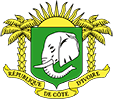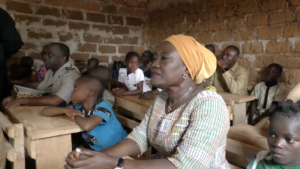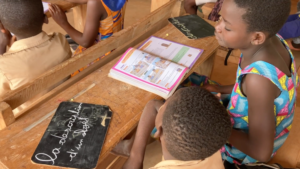In this blog, we build on our first two reports about the Child Learning and Education Facility (CLEF) program’s “bridging classes. This third piece highlights community mobilization around bridging classes and shows promising perspectives for children who are benefiting from the program.
In sub-Saharan Africa, one in five children works – 70% of them in agriculture. Poverty is a key factor, alongside inadequate school infrastructure and children having to walk a long way to school. In Côte d’Ivoire, the government is resolutely committed to fighting this scourge. It’s tackling the root causes, by improving access to, and the quality of education, as well as by strengthening social protection systems. The Ministry of Education and Literacy is contributing to this national effort with the Child Learning and Education Facility (CLEF) program, supported by philanthropic foundations, as well as by the cocoa and chocolate industry.
The CLEF program has ambitious objectives. Between now and 2027, it will provide four million children with more effective teaching around reading and arithmetic. Additionally, the program aims to support 1.6 million parents to become more involved in their children’s education. By 2027, some 20,000 children, who are currently out of school, can expect to be enrolled into the formal school system.
How can this initiative help so many “out-of-school” children make a transition into formal education? CLEF’s answer is to set up 660 “bridging classes” across six cocoa-producing regions in the west and south-west of Côte d’Ivoire.
An innovative public-private partnership
The Ministry of National Education and Literacy runs this bridging class initiative within CLEF, a joint funding mechanism that draws together the Côte d’Ivoire government, 16 cocoa and chocolate companies, and two philanthropic foundations.
Non-governmental organizations are crucial to this effort. They have been tasked by the Ministry to set up the bridging classes. For example, “École pour tous”, an Ivorian NGO, oversees bridging classes in cocoa-growing regions of south-western Côte d’Ivoire. In the village of Kouamékro, close to the city of Divo, staff work at the grassroots, determined to ensure that children feel welcome and motivated in settings that are most conducive to learning. “The children receive a school kit and a meal in the canteen,” confides Sékou Touré, President of ‘École pour tous’. “That’s what keeps the children coming back.”
Communities are also mobilizing around bridging classes, providing “class shelters” to host the bridging classes. Madame Yao, for example, grew up in Kouamékro and has generously lent two premises to the project. These premises are being used by the children enrolled in the bridging classes, as well as by their supervisors. “There are children who have never been to school, ” explains Madame Yao. “I’m surprised and delighted to see them reading, writing and counting. It gives us a lot of hope.”
Encouraging initial feedback
Sékou Touré, who has pioneered bridging classes in Côte d’Ivoire, is also very optimistic: “At the end of this first campaign, parents of children enrolled in Kouamékro’s bridging classes feel so pleased: they recognize that their children are now able to read, write and count!”
A key ambition of the learning program is that every pupil can keep up with the teaching – no child is left behind. The PEC (Programme de l’Enseignement Ciblé or Teaching at the Right Level) teaching principle requires that skills’ development takes place at the children’s learning pace. Its secret is that children learn through play. As a result, subjects such as Maths and French, which can be daunting for children who feel rusty around classroom learning, turn into engaging activities that feel more digestible.
This initiative tries to integrate two types of children into formal education: those who have never attended school, others who have dropped out. But it goes beyond helping children to claim their right to an education. It’s also about cutting the prevalence of child labor, particularly in cocoa-producing communities.
Sékou Touré knows success is achievable: “Some students who joined bridging classes that we launched a few years ago have become agricultural entrepreneurs. Others are police officers, civil servants or work in civil engineering,” he explains. “So, it’s a system that’s already proved its value. I’m delighted when children stay in school. Regardless of whether they end up as an executive or a farmer or in some other job, the important thing for me is that they complete their school career.”
CLEF is a commitment to:
- get more children into school.
- make sure children learn at school.
- Achieve impact at scale; we want to make a difference in the lives of more than 4 million children by 2027.
CLEF funds school infrastructure and childcare facilities, supports teacher training in evidence-based pedagogical techniques, promotes behavior change so parents engage in their children’s education and apply good parenting practices to boost early childhood development, and tests a cutting-edge school nutrition program.
CLEF welcomes new partners: contact us to learn more about the initiative and to get involved.



